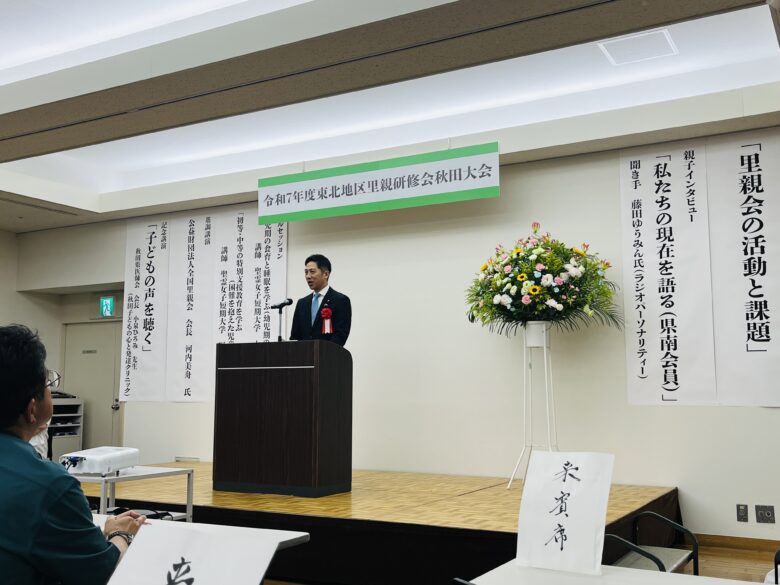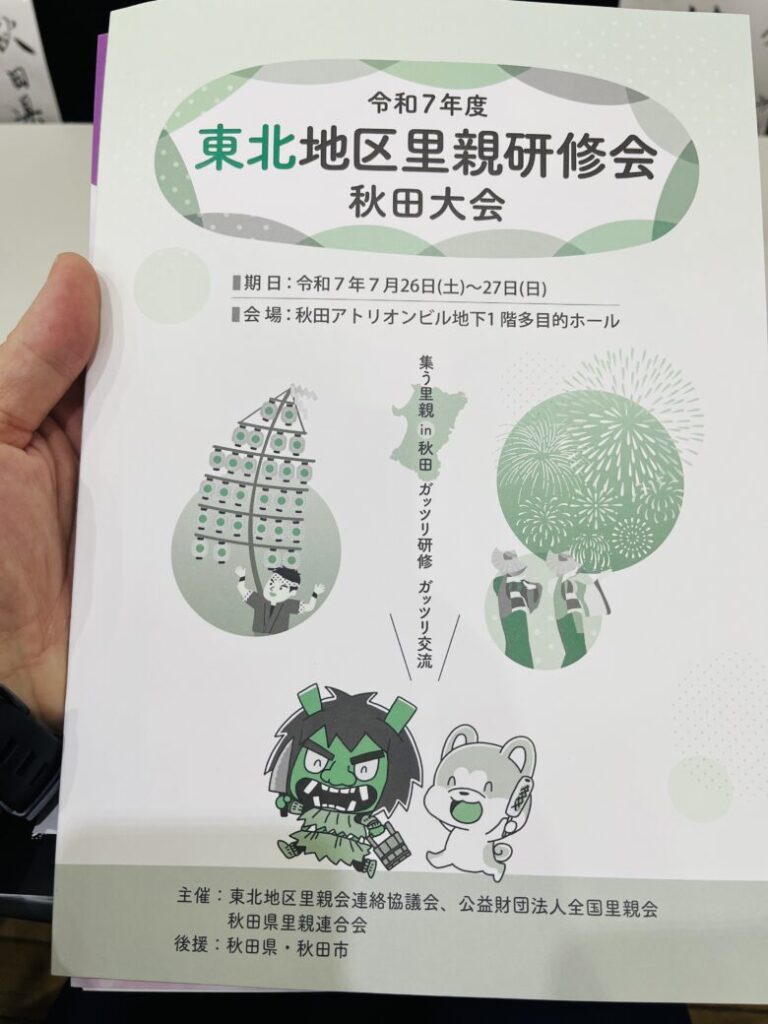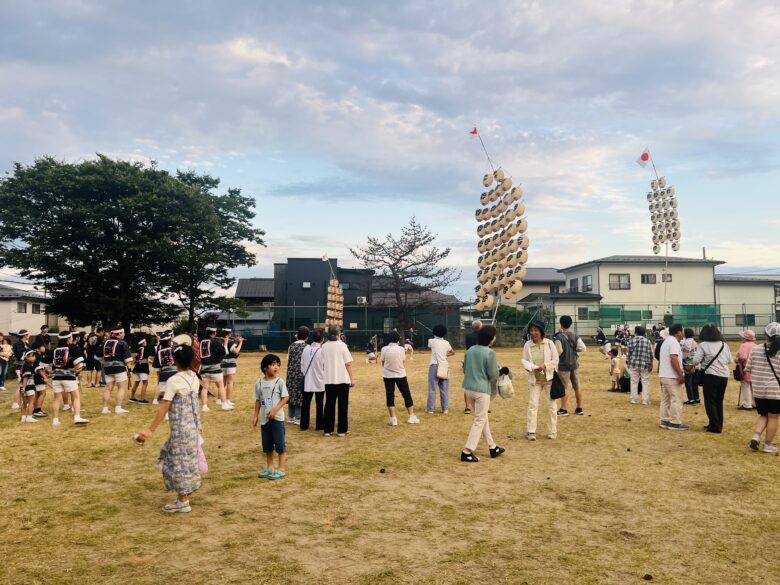令和7年(2025年)7月26日〜27日の日程で秋田行われました。里親制度への理解と啓発を行うため、講演、体験発表、意見交換などを通して、里親子の相互理解と交流を図ることを目的に行われ、東北各県からの参加者がありました。里親を応援する会の会員である議員や秋田県知事なども参加しており、里親委託率を上げる目標に向かって、理想的な養護の担い手としての意識啓発や知識を得る場となりました。
記念講演は、「子どもの声を聴く」と題して小泉ひろみ医師が行いました。この講演が非常に興味深く、思わず聞き入ってしまいましたので少し紹介します。
秋田こどもの心と発達クリニック院長・小泉ひろみ医師による記念講演では、「子どもの声に耳を澄ます」という姿勢が終始貫かれていました。子どもは自分の気持ちをうまく言葉にできず、時に行動として現れる。その感情を大人が代弁し、否定せず受け止める「言葉の支援」が、回復への大きな一歩になると語られました。
特に印象的だったのは、オープンダイアローグという手法の紹介です。これは、フィンランド発祥の精神医療における対話型アプローチで、すぐに答えを出さず、時間をかけて「結論のないおしゃべり」を続けることで、本人の内面の扉が少しずつ開いていくというもの。話したくない子どもに対しても、「横で大人たちが話し続ける」ことが、やがて耳を傾けるきっかけになる——そんな静かな信頼の関わり方が紹介されました。
また、思春期の子どもと向き合う際は、「地雷畑に住んでいると思って、そっと一歩引いて待つことが大切」という表現が心に残りました。爆発的な反応を引き出さないためにも、一旦距離を取り、安全な関係を維持することが求められます。そして、落ち着いたタイミングで「なぜ?どうして?」と詰め寄るのではなく、「あれは何だったんだろうね」と気持ちをそっと代弁するような言葉がけが有効であるとされました。
さらに印象的だったのは、「何もしない時に褒める」という支援のあり方です。子どもが特別な行動をしなくても、「弟と遊んでくれてありがとう」「おもちゃ箱をきれい片づけてくれてありがとう」といった、日常の中の肯定的な声かけが前頭葉を活性化させるという知見が紹介されました。これは、コンビニのトイレに貼られた「いつもきれいに使ってくれてありがとうございます」という張り紙にも応用されている、心理的な働きかけです。
「病名ではなく、その子自身を見る」。この姿勢が、子どもの心を支える原点であるとあらためて感じさせられる講演でした。
地元の夏祭りに参加してきました
同日の夕方から、私の住んでいる町内の夏祭りに参加してきました。コロナ禍が明けてから年々参加者が増えているとのことで、準備した焼きそばなどの縁日の食べ物がメインイベントの竿灯(勝平)の演技が始まる前に売り切れとなっており、担当の方が去年の倍近く買って用意したのにと悔しそうに仰っておられました。小学校がある町内であることと、学童も兼ねているエンジェルハウスさんのご尽力によりキッチンカーが来ることなど様々な理由で、参加者が増えているのだと思いますが、あまりの盛況ぶりに他の町内会から視察にも来るのだとか。たくさんの人が子どもが楽しんでもらうために工夫した結果なのだと思いますし、それが我が町内であることは誇らしい限りです。



【English】
250726 – Attended the 2025 Tohoku Foster Parent Training Seminar in Akita
I joined the Tohoku Region Foster Parent Training Seminar held in Akita on July 26–27, 2025. The goal of the event was to help people understand the foster care system better. Through lectures, personal stories, and group discussions, the event helped deepen the connection and understanding between foster parents and children. People from all over the Tohoku region came to participate.
Many people supporting foster care, including local lawmakers and the Governor of Akita Prefecture, were also there. The seminar gave us a chance to learn more about foster care and think about how to increase the number of foster placements.
The keynote speaker was Dr. Hiromi Koizumi, a child psychiatrist and head of the Akita Child Mind and Development Clinic. Her lecture, called “Listening to the Voices of Children,” was very powerful and moving.
Dr. Koizumi said that children often can’t explain how they feel with words. Instead, they show their feelings through actions. Adults should try to understand and speak for their feelings gently, without judging them. This helps children feel heard and start to heal.
One method she shared was called Open Dialogue, which started in Finland. In this method, instead of giving advice right away, adults keep talking calmly around the child. Even if the child doesn’t speak, hearing the adults talk with care helps build trust and opens their hearts over time.
Another powerful idea she shared was about teens. She said, “Think of it like walking through a minefield—step back and wait quietly.” If a teen is upset, it’s better not to rush them or pressure them. Wait until things calm down, and then say something like, “I wonder what that was about,” instead of asking “Why did you do that?” This helps keep the conversation safe.
Dr. Koizumi also taught us the power of saying thank you for ordinary things. Even if a child didn’t do anything big, saying, “Thanks for playing nicely with your brother,” or “Thanks for putting away your toys,” helps their brain grow stronger and feel safe. It’s the same idea as the kind messages we see in public restrooms like “Thanks for keeping this toilet clean.”
The main message was: “See the child, not just a diagnosis.” This talk reminded us that every child needs to be seen and heard for who they really are.
Joined My Local Summer Festival
In the evening of the same day, I joined the summer festival in my own neighborhood. Since the end of the COVID-19 pandemic, more and more people have been coming each year. This time, the food stalls like yakisoba (fried noodles) sold out before the main event — the Kanto (pole lantern) performance from Katsuhira — even started! One of the staff members said they had prepared almost twice as much food as last year, but it still wasn’t enough. They looked pretty frustrated.
I think the number of participants is growing for several reasons. There’s an elementary school in the area, and thanks to the help of Angel House, which also runs after-school care, even kitchen cars came to the event. It was so popular that people from other neighborhoods came to watch and learn how we do things.
I believe this success is because many people worked hard to create a fun time for the children. I feel proud that such a great festival was held right here in our own community.
【Español】
250726 – Participé en el Seminario de Capacitación para Familias de Acogida de la Región Tohoku 2025 en Akita
Asistí al Seminario Regional de Familias de Acogida de Tohoku que se realizó en Akita del 26 al 27 de julio de 2025. El objetivo fue promover el entendimiento del sistema de acogida familiar. Hubo charlas, experiencias personales y espacios para conversar, todo con el fin de fortalecer la conexión entre madres/padres de acogida y niños. Vinieron participantes de todas las provincias del noreste de Japón.
También participaron personas que apoyan este sistema, como diputadas y diputados, y el gobernador de Akita. Fue una buena oportunidad para aprender y pensar en cómo aumentar la cantidad de familias que reciben niños en acogida.
La charla principal fue dada por la doctora Hiromi Koizumi, psiquiatra infantil y directora de la Clínica Infantil de Mente y Desarrollo en Akita. Su charla se llamó “Escuchar la voz de las niñas y niños”, y fue realmente inspiradora.
La doctora explicó que muchas veces las niñas y los niños no saben cómo decir lo que sienten. Entonces lo muestran con su comportamiento. Los adultos deben tratar de interpretar esas emociones y expresarlas con palabras, sin juzgar. Esto puede ser un primer paso muy importante para que los niños comiencen a sanar.
Un método muy interesante que presentó fue el Diálogo Abierto, que viene de Finlandia. En vez de dar consejos de inmediato, las personas adultas siguen conversando de forma tranquila, aunque el niño no hable. Escuchar esas conversaciones puede hacer que poco a poco él o ella comience a abrirse.
También dijo algo muy cierto sobre adolescentes: “Es como caminar en un campo minado: mejor dar un paso atrás y esperar.” Si un adolescente está molesto, es mejor no presionarlo. Más adelante, cuando esté tranquilo, en vez de preguntar “¿Por qué hiciste eso?”, es mejor decir algo como “¿Qué habrá pasado ahí?” con calma. Eso ayuda a que la conversación no sea una pelea.
Otra cosa que me quedó grabada fue cómo ayudar reconociendo lo cotidiano. Aunque el niño no haga algo especial, decir “Gracias por jugar con tu hermanito” o “Gracias por guardar tus juguetes” activa su cerebro de manera positiva y lo hace sentirse valorado. Es parecido a los mensajes que vemos en los baños públicos que dicen “Gracias por dejar limpio este baño.”
El mensaje más importante fue: “Ver a la niña o el niño, no solo su diagnóstico.” Esta charla nos recordó que todas las niñas y niños necesitan que alguien los vea, los escuche y los entienda como personas únicas.
Participé en el festival de verano de mi comunidad
Esa misma tarde participé en el festival de verano de mi propio barrio. Desde que terminó la pandemia de COVID-19, cada año hay más gente asistiendo. Esta vez, los puestos de comida como el yakisoba (fideos fritos) se agotaron antes de que comenzara el evento principal: la presentación de faroles Kanto del barrio Katsuhira. Una de las personas encargadas me comentó, con algo de frustración, que habían comprado casi el doble de comida que el año pasado… ¡y aún así no fue suficiente!
Creo que hay varias razones por las cuales ha aumentado tanto la participación. En la zona hay una escuela primaria, y gracias al gran esfuerzo de Angel House —que también funciona como centro de cuido después de clases— incluso vinieron food trucks al festival. Fue tan exitoso que representantes de otras comunidades vinieron a ver cómo lo organizamos.
Siento que todo esto es resultado del trabajo de muchas personas que quisieron que las niñas y los niños la pasaran bien. Y me llena de orgullo que un festival tan bonito ocurriera justo aquí, en nuestra comunidad.
